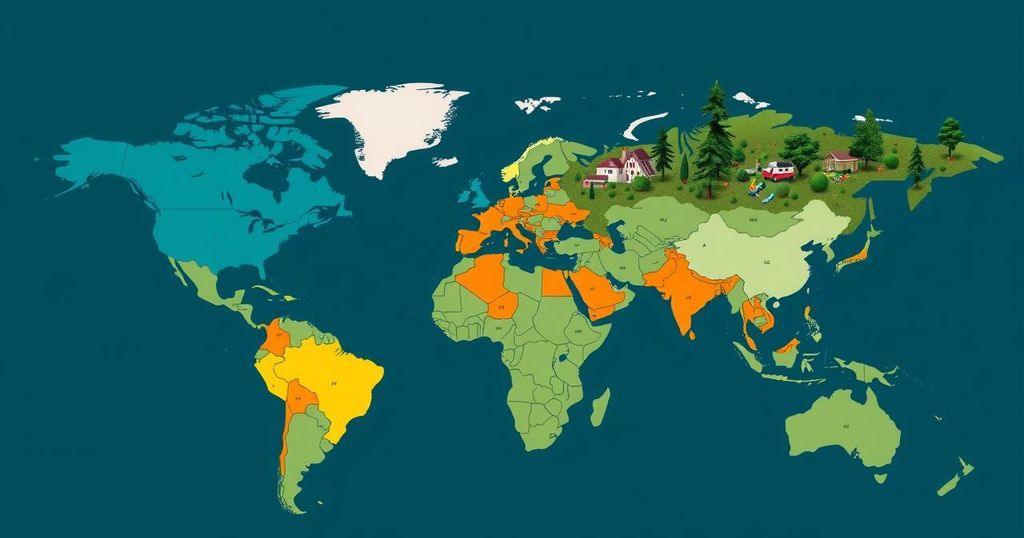Wealthier nations are beginning to provide compensation for climate-related damages to poorer countries, like Malawi, following disasters such as Cyclone Freddy. A new funding initiative aims to address the financial impacts faced by nations that contribute little to global emissions. The COP29 summit will discuss further financial responsibilities and strategies for aiding developing regions most affected by climate change, a crucial step to ensure their recovery and resilience.
In the wake of Cyclone Freddy, which devastated southern Malawi in 2023, affected families like that of Christopher Bingala have begun to receive “loss and damage” compensation from wealthier nations. These payments, amounting to $750 for individuals like Bingala, represent a critical step in addressing the financial repercussions of climate-driven disasters in low-income countries, which contribute little to global greenhouse gas emissions. The funds, in part, stem from a commitment made at last year’s climate summit involving countries such as the European Union and the United States, totaling approximately $720 million pledged for climate-related damages. Experts caution, however, that this amount is inadequate in light of the increasing frequency and severity of climate-induced events.
At the ongoing COP29 summit in Baku, stakeholders are discussing how to allocate these funds among developing nations while emphasizing the moral obligation of previously industrialized nations to support those disproportionately impacted. Stories like Bingala’s highlight the urgent need for a comprehensive system to support families devastated by natural disasters, which often lack insurance or substantial recovery resources. This pilot program, introduced by the Scottish government, provided crucial funds intended to enable rebuilding efforts and facilitate the resumption of essential services like education and agriculture.
The climate crisis demands immediate action; rising sea levels and extreme weather conditions are expected to burden developing nations with financial losses projected to reach $250 billion annually by 2030. With requests for funding encompassing more than just recovery—such as the relocation of communities and preservation of critical natural heritage—the negotiations at COP29 will be pivotal in shaping future climate finance. Prime Minister Philip Davis from The Bahamas emphasized the urgent need for collective responsibility, warning that the repercussions of inaction will extend beyond borders, leading to a humanitarian crisis that will affect wealthy nations as well.
In summary, the introduction of loss and damage funding marks a significant step towards mitigating the impacts of climate change on low-income countries. However, the financial commitments made by rich nations thus far remain inadequate in addressing the complete scale of impending climate disasters. As discussions at COP29 continue, the implementation of robust funding mechanisms will be essential to support vulnerable communities and confront the escalating climate challenge effectively.
The global discourse surrounding climate change has increasingly identified the need for developed nations to provide financial support to developing countries disproportionately affected by climate-related events. With the recent establishment of funding mechanisms for “loss and damage,” countries like Malawi face critical challenges due to natural disasters, yet have contributed minimally to greenhouse gas emissions. This framework aims to enhance resilience and recovery in low-income nations grappling with extreme weather patterns, notably evident in Cyclone Freddy’s aftermath. The COP29 summit serves as a platform for negotiating the disbursement of climate finance, underscoring a call for wealthier nations to uphold their responsibility in fostering global solidarity.
In conclusion, the establishment of a loss and damage compensation framework is an essential development in addressing the financial hardships inflicted by climate change on poorer nations. As negotiations at the COP29 summit unfold, it is paramount that the commitment made by affluent countries translates into tangible support for those most affected by climate-induced disasters. The urgency of the situation requires robust international cooperation to ensure that vulnerable populations are uplifted and equipped for the future challenges posed by an escalating climate crisis.
Original Source: www.wprl.org






